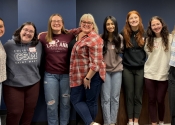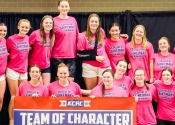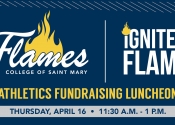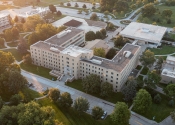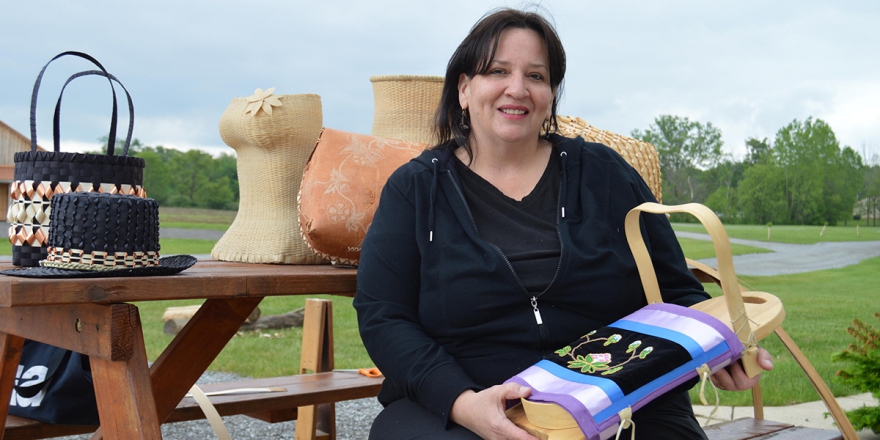
Visiting Native American artist uses ancient art of basket-making to raise awareness for ash tree epidemic
OMAHA, NEB. – This spring students at College of Saint Mary have had the opportunity to take visual art classes from Kelly Church, a world-renowned artist, graduate of the American Institute of Indian Arts, and community activist. College of Saint Mary’s first Native American visiting artist, Church is trained in the ancient art of ash basket weaving and is dedicated to saving natural resources that are crucial to her and local residents.
“Passing on this time honored tradition before the decimation of our ash trees has become my life’s work,” says Church.
The artist, who has been featured at the Smithsonian and is a four-time fellowship recipient of the National Museum of the American Indian Artist Leadership Program, is using her art to bring attention to the rapid destruction of ash trees in Omaha and regions throughout the Midwest.
Because of the Emerald Ash Borer, an invasive beetle, experts have predicted the entire ash tree population could disappear in the coming years.
“Emerald ash borer is considered to be the most destructive insect pest of trees ever to occur in the United States,” says Laurie Stepanek, forest health specialist with the Nebraska Forest Service. “Our native ash trees are very susceptible to this invasive exotic insect, and over time we will likely lose the majority of our ash trees.”
In Nebraska, some 44 million Nebraska ash trees have been wiped out. Church is using her first-ever trip to Nebraska to fight to preserve the region’s ash population and teach her ancient craft.
“It is my first time to Nebraska,” Church said. “It is a very diverse and beautiful community based on what I have seen so far. I saw this as a new adventure and a great opportunity to share and teach.”
Church uses her ancient art form of basket weaving to spread awareness about the dwindling tree population in unique ways. For instance, by making what she calls “Fiberge eggs”, egg-shaped baskets weaved from forest fibers, she is able to connect with audiences in an eye-opening display.
“When you open the egg, it will contain a vial filled with the Emerald Ash Borer, larvae of Emerald Ash Borer, or both,” she said. “It is made to draw the viewer in and then get them wondering what a bug has to do with a basket.”
By bringing her basket-weaving craft to Nebraska, Church hopes to raise awareness about local ash devastation, bring opportunities for preservation, and pass on her techniques.
“It’s exciting, bringing things to the Midwest that really aren’t here,” said CSM Director of the Fine Arts Dr. Chris Krampe.
Church brings her centuries-old, award-winning craft to students at CSM as part of a recent push to provide powerful art experiences to both students and the community. CSM’s emphasis on bringing in dynamic visiting artists like Church is part of the college’s broader mission to inspire art appreciation, bring art to the community, and allow students to grow as individuals through life-changing experiences.
“You don’t see this type of program at many colleges today,” said. Dr. Krampe. “In this case we’re providing opportunities for our students and community to grow artistically, while also shining light on socially relevant issues in society today.”
Church comes from an unbroken line of black ash basket makers. A member of the Match-e-be-nash-she-wish tribe of Ottawa and Pottawatomi in Michigan, she is exposing students and the community to high-level techniques and crafts grounded in deep cultural roots.
“We have been making baskets for centuries,” said Church. “My grandmother once said, ‘We made baskets before they made cameras'."
In a special basket-making class, students are learning various weaving techniques, working hands-on with traditional materials. Each lesson is based on Traditional Native weaving methods that have been practiced by Church’s ancestors for centuries and will help students discover skills, new avenues for expression, and lasting character traits.
“Patience is the first and most important discipline learned,” said Church. “It took me weeks, to months, to learn to weave, and patience is needed.”
As an inspiring woman, active leader, and community advocate, her presence within CSM’s inclusive campus setting will serve as a valuable resource for the CSM community. It will also open the doors to on-campus projects, student activism, and opportunities for students to actively learn through art.
“I like it; it’s something new for me,” said CSM student Liana Naquila. “It can be hard. If you make a mistake, you have to start over again from the beginning. Miss Kelly tries to challenge us. She teaches us, but doesn’t do it for you—we’re accomplishing this on our own and that’s the best way to learn in life.”
In addition to teaching CSM students, Church will also work with the college to bring inspiring art opportunities to the broader Omaha community through several workshops and lectures. These outreach events are made possible with the support of the Nebraska Arts Council, the Nebraska Cultural Endowment, and Humanities Nebraska.
Ancient Art of Basket Making Workshop Schedule (reservations required):
- Glacier Creek Preserve, 14810 State St., Bennington. 1 to 4 p.m. April 11. Cost: $20. RSVP: mmccracken [at] csm.edu.
- Lauritzen Gardens, 100 Bancroft St. 6 to 8 p.m. May 2. Cost: $20 members; $30 non-members. RSVP: 402-346-4002.
- Great Plains Art Museum, 1155 Q St, Lincoln. 3 to 5 p.m. May 9. Cost: $20. RSVP: 402-472-6220
Ancient Art of Basket Making Lecture & Presentation Schedule:
- Metro Community College Elkhorn Campus, 829 North 204th St, Elkhorn. 12:30 to 1:45 p.m. March 29. Free.
- Glacier Creek Preserve, 14810 State St., Bennington. 6 to 8 p.m. April 11. Free (for lecture only, see above)
For more information, call 402-399-2621.
Church holds an Associate of Fine Arts (AFA) degree from the Institute of American Indian Arts and a Bachelor of Fine Arts (BFA) degree from the University of Michigan. Her classes are currently underway and will continue at CSM throughout the spring.








